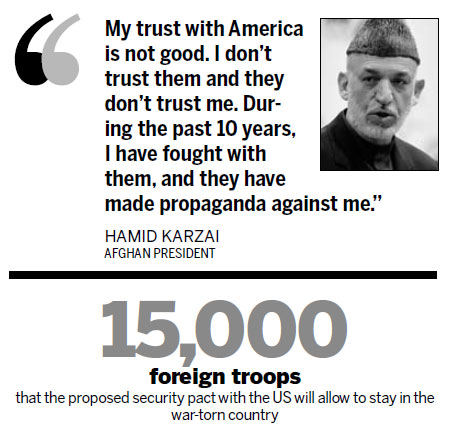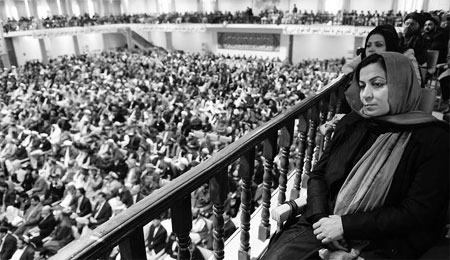Karzai says Kabul needs US deal
Country's grand council in fierce debate over pact
Afghan President Hamid Karzai told a meeting of tribal elders and political leaders on Thursday they should support a security pact with the United States, but he acknowledged there was little trust between the two nations.
Karzai told the Loya Jirga, or grand council, that US President Barack Obama had sent him a letter of assurance that a security pact between the two countries was in Afghanistan's best interest.
He said that Obama promised that US troops would only enter Afghan homes under exceptional circumstances, a request Karzai has been reluctant to accede to and which held up negotiations until late on Wednesday.
He also backed a proposed security pact with the US that will see up to 15,000 foreign troops stay in the war-torn country, but said it would not be signed until after next year's election.
The Loya Jirga convened a day after Karzai and Washington reached agreement on the pact, which defines the shape of the US military presence after a 2014 drawdown of the multinational NATO force.
"My trust with America is not good. I don't trust them and they don't trust me," Karzai told the assembly. "During the past 10 years, I have fought with them, and they have made propaganda against me."

Delegates at the five-day Loya Jirga, many of them bearded men with elaborate turbans but with women among them, too, will debate the draft and decide whether to accept it - whether they want US troops to stay, or leave Afghan forces to fight the Taliban insurgency alone.
The pact also has to be approved by Parliament.
If the US pulls out, others are expected to follow suit and a thinner international presence could deter donors from releasing promised funds. After more than 12 years of war, Afghanistan remains largely dependent on foreign aid.
While the pact is widely expected to pass, several thorny issues, including jurisdiction over troops, could hold up a decision.
Karzai made no reference in his speech to the question of jurisdiction over US troops, which two years ago prompted the US to pull most forces out of Iraq.
"We want this pact in order to move out of this unsteady situation. If the foreigners leave unhappy, it will be very dangerous for us," Karzai told the gathering.
The US and Afghanistan have spent much of the past year wrangling over the agreement, but ultimately the US won concessions in several areas of contention.
Along with immunity from Afghan law for its troops, these included a request to allow US forces to search for militants in Afghan homes, which outrages Afghans and which Karzai has long opposed because of the anger it causes.
"American forces for military operations will enter Afghan homes only in exceptional and extraordinary cases ... only in circumstances where there is a serious threat against American troops," Karzai said.
Afghanistan has a long tradition of Loya Jirgas when important affairs of state are to be discussed.
Karzai called the assembly in order to muster public support for the pact, which is regarded by many Afghans with contempt.
As Karzai spoke about US assurances, a woman senator leapt up to interrupt him, shouting that any deal with the US amounted to selling the country out.
The Taliban, fighting to expel foreign forces and impose their vision of Islamist rule, have condemned the Loya Jirga as a farce. Insurgents fired two rockets at the tent where the previous Loya Jirga was held in 2011, but there was no violence as Karzai opened proceedings.
The elders and leaders, who have traveled from all over the country to attend, have voiced frustration over the way negotiations between Kabul and Washington have been conducted.
The draft was only agreed at the last minute on the eve of the Loya Jirga after Karzai tried to persuade the US to wait until a new president was elected in order to sign the deal, an option opposed by Washington.
Reuters-AFP
|
Members of the Afghan Loya Jirga, a meeting of around 2,500 Afghan tribal elders and leaders, listen during the first day of a four-day long conference in Kabul on Thursday. Massoud Hossaini / Agence France-Presse |
(China Daily 11/22/2013 page11)









